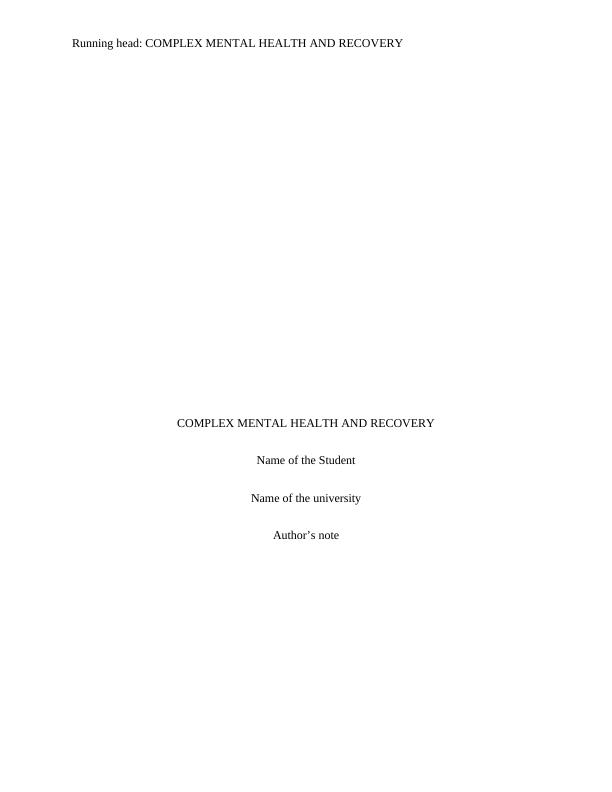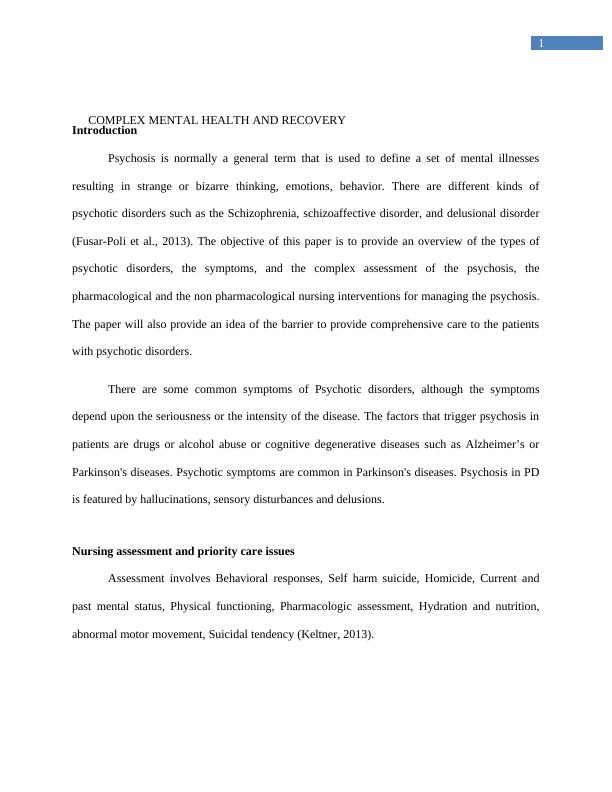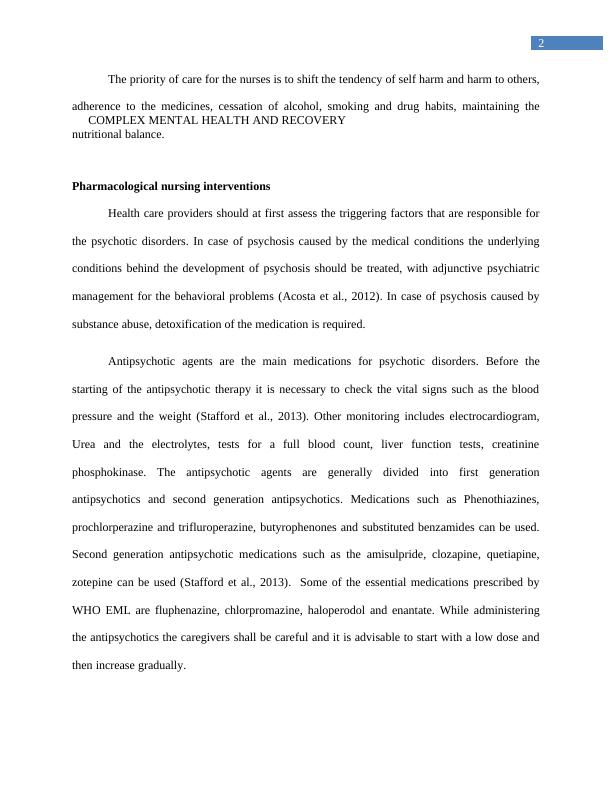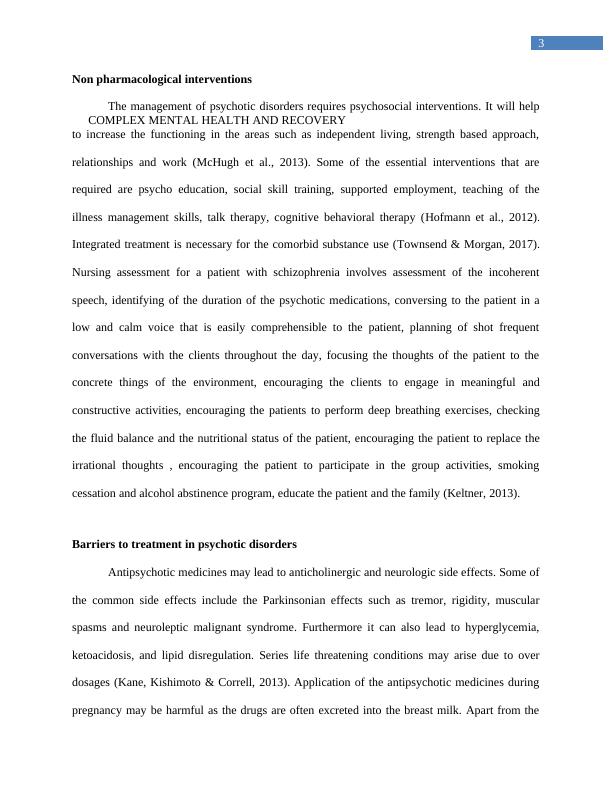Complex mental Health and Recovery Assignment PDF
Added on 2021-04-21
11 Pages2120 Words113 Views
Running head: COMPLEX MENTAL HEALTH AND RECOVERYCOMPLEX MENTAL HEALTH AND RECOVERYName of the StudentName of the universityAuthor’s note

1COMPLEX MENTAL HEALTH AND RECOVERYIntroductionPsychosis is normally a general term that is used to define a set of mental illnessesresulting in strange or bizarre thinking, emotions, behavior. There are different kinds ofpsychotic disorders such as the Schizophrenia, schizoaffective disorder, and delusional disorder(Fusar-Poli et al., 2013). The objective of this paper is to provide an overview of the types ofpsychotic disorders, the symptoms, and the complex assessment of the psychosis, thepharmacological and the non pharmacological nursing interventions for managing the psychosis.The paper will also provide an idea of the barrier to provide comprehensive care to the patientswith psychotic disorders. There are some common symptoms of Psychotic disorders, although the symptomsdepend upon the seriousness or the intensity of the disease. The factors that trigger psychosis inpatients are drugs or alcohol abuse or cognitive degenerative diseases such as Alzheimer’s orParkinson's diseases. Psychotic symptoms are common in Parkinson's diseases. Psychosis in PDis featured by hallucinations, sensory disturbances and delusions. Nursing assessment and priority care issuesAssessment involves Behavioral responses, Self harm suicide, Homicide, Current andpast mental status, Physical functioning, Pharmacologic assessment, Hydration and nutrition,abnormal motor movement, Suicidal tendency (Keltner, 2013).

2COMPLEX MENTAL HEALTH AND RECOVERYThe priority of care for the nurses is to shift the tendency of self harm and harm to others,adherence to the medicines, cessation of alcohol, smoking and drug habits, maintaining thenutritional balance.Pharmacological nursing interventionsHealth care providers should at first assess the triggering factors that are responsible forthe psychotic disorders. In case of psychosis caused by the medical conditions the underlyingconditions behind the development of psychosis should be treated, with adjunctive psychiatricmanagement for the behavioral problems (Acosta et al., 2012). In case of psychosis caused bysubstance abuse, detoxification of the medication is required.Antipsychotic agents are the main medications for psychotic disorders. Before thestarting of the antipsychotic therapy it is necessary to check the vital signs such as the bloodpressure and the weight (Stafford et al., 2013). Other monitoring includes electrocardiogram,Urea and the electrolytes, tests for a full blood count, liver function tests, creatininephosphokinase. The antipsychotic agents are generally divided into first generationantipsychotics and second generation antipsychotics. Medications such as Phenothiazines,prochlorperazine and trifluroperazine, butyrophenones and substituted benzamides can be used.Second generation antipsychotic medications such as the amisulpride, clozapine, quetiapine,zotepine can be used (Stafford et al., 2013). Some of the essential medications prescribed byWHO EML are fluphenazine, chlorpromazine, haloperodol and enantate. While administeringthe antipsychotics the caregivers shall be careful and it is advisable to start with a low dose andthen increase gradually.

3COMPLEX MENTAL HEALTH AND RECOVERYNon pharmacological interventionsThe management of psychotic disorders requires psychosocial interventions. It will helpto increase the functioning in the areas such as independent living, strength based approach,relationships and work (McHugh et al., 2013). Some of the essential interventions that arerequired are psycho education, social skill training, supported employment, teaching of theillness management skills, talk therapy, cognitive behavioral therapy (Hofmann et al., 2012).Integrated treatment is necessary for the comorbid substance use (Townsend & Morgan, 2017).Nursing assessment for a patient with schizophrenia involves assessment of the incoherentspeech, identifying of the duration of the psychotic medications, conversing to the patient in alow and calm voice that is easily comprehensible to the patient, planning of shot frequentconversations with the clients throughout the day, focusing the thoughts of the patient to theconcrete things of the environment, encouraging the clients to engage in meaningful andconstructive activities, encouraging the patients to perform deep breathing exercises, checkingthe fluid balance and the nutritional status of the patient, encouraging the patient to replace theirrational thoughts , encouraging the patient to participate in the group activities, smokingcessation and alcohol abstinence program, educate the patient and the family (Keltner, 2013). Barriers to treatment in psychotic disorders Antipsychotic medicines may lead to anticholinergic and neurologic side effects. Some ofthe common side effects include the Parkinsonian effects such as tremor, rigidity, muscularspasms and neuroleptic malignant syndrome. Furthermore it can also lead to hyperglycemia,ketoacidosis, and lipid disregulation. Series life threatening conditions may arise due to overdosages (Kane, Kishimoto & Correll, 2013). Application of the antipsychotic medicines duringpregnancy may be harmful as the drugs are often excreted into the breast milk. Apart from the

End of preview
Want to access all the pages? Upload your documents or become a member.
Related Documents
Comparing the effectiveness of non-pharmacological and pharmacological interventions for Schizophrenia in UK: systematic reviewlg...
|5
|981
|217
Assessment of Experience of Mental Health-Nursing Students with Psychiatric Patientslg...
|4
|849
|62
Primary, Secondary and Tertiary Mental Health Care?lg...
|14
|6518
|18
Schizophrenialg...
|8
|1859
|25
Evidence based practice in mental health intervention or treatment for mental disorderlg...
|11
|3307
|467
Comparison of Pharmacological and Non-Pharmacological Interventions for Schizophrenia Treatmentlg...
|6
|861
|189
